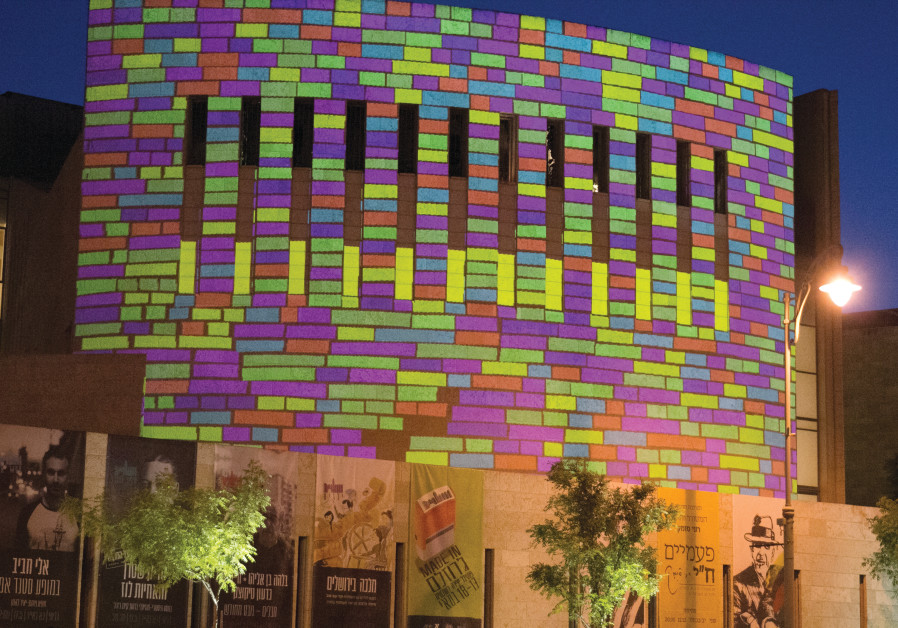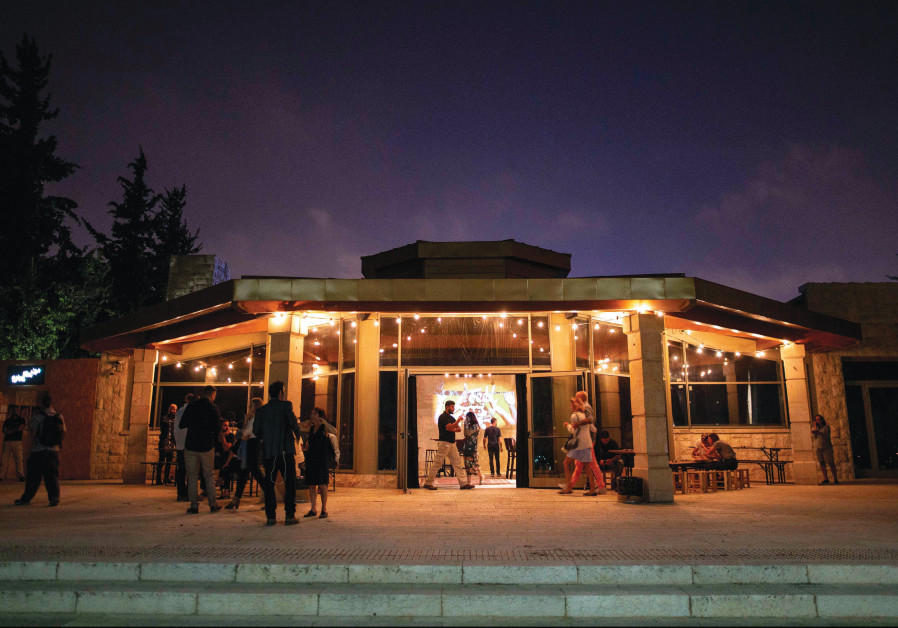The world of culture here has taken several body blows over the past year or so, and with little on offer in the way of government support. That led to wholesale unpaid leave of staff members of arts institutions across the board, and left some hanging on by the skin of their teeth.
Naturally, it is the smaller players who are most at risk. Even when lockdowns, prohibitions on gatherings and other pandemic constraints are not in place, Jerusalem’s minor league purveyors of cultural wares have a hard time balancing the books.
So how, for example, has the Mikro Theater Company managed to get through thus far?
Not that the actors, backstage staff and Mikro founder and artistic director Irina Gorelik were exactly just sitting around bemoaning their pandemic furlough fate.
“Not everyone was on unpaid leave,” Zinger explains. “There were all sorts of activities, and we had rehearsals. But it was very tough on the actors.”
Mikro has been around for 20 years now, and moved into its current cozy premises, nestling deep in the heart of the Jerusalem Theater complex, in 2015.
“It’s a good place, and we feel good here” the CEO notes.
The company has evolved over the years, from a largely Russian culture-leaning outfit to one of the most creative and adventurous ventures in the field across the country.
Some years ago, a left-field Jerusalemite DJ told me, in so many words: “We don’t attract large crowds, and we don’t really make a living from this, so we just do what we want. We don’t need to pander to any commercial interests.” Financial downside notwithstanding, there is something to be said for operating on the margins of the mainstream entertainment sphere.
So, what is actual cold reality like for a small theater in our capital city? In a nutshell, Zinger says it is an ongoing juggling act, on various levels.
“There is always this dissonance between artistic ambitions, what you’d really like to do, and the state of your bank account,” he chuckles wryly. “The smaller you are in the Israeli market, the tougher it gets. You get less resources.”
Mikro does, in fact, receive financial assistance, from the Jerusalem Municipality and Culture Ministry, although it seems that still leaves the company scratching around for wherewithal.
The inescapable conclusion is that for many cultural institutions in Jerusalem, life ain’t easy, even without the COVID-19 outbreak.
Not that the lockdowns helped matters.
“We lost around NIS 250,000 in revenue in 2020,” Zinger notes. But, the show has to go on. “I am the CEO and also the marketing manager. Many of us double up, and take on other roles, and we manage. We have less staff, so we cut down on our salary outgoings. But that is the world of fringe arts.”
Zinger is not against commercialized arts offerings. “The fringe in Israel doesn’t get its due. What the fringe is creating today will become part of the wider common denominator in 10, 20 or 30 years’ time.
“I am not criticizing that. I don’t say there is no room for the wider common denominator. However, the fringe and indie arts lack the resources, although they, in the long term, drive culture onward to the more interesting things. Shakespeare, when he started putting his plays out, wasn’t part of the mainstream either. When Beethoven wrote his Third Symphony, people asked him what that noise was.”

THE STILL relatively new municipality Heichal Hatarbut multidisciplinary arts center, over in Pisgat Ze’ev, could certainly be said to pertain to the “wider common denominator” sector of the Israeli entertainment industry, although, like everywhere else, it has had its challenges, too.
“We opened right in the middle of the [pandemic] mess,” says director Ayala Turjeman, “in June [2020]. Then we had to close, just four days later. We’ve had our ups and downs, and we had to cancel three or four productions because of the lockdowns.”
Even with generous support from the municipality – the center is affiliated with the municipal department of culture – Turjeman and her colleagues have had their work cut out for them.
Turjeman says the enforced cessation of activities pushed her and her staff, none too gently, into a rethink about the way forward, as it did for entertainment facilities across the city. “At the end of August and into September there was the possibility of employing [audience] capsules for outside events. What was great about that time was that we had to start doing all sorts of things we never previously considered.”
As many an inventor would tell you, all sorts of innovations were spawned by unplanned developments. “The outdoor events were so successful that we decided to carry on with them later in the year. We’ll call the series Sounds on the Patio, or something like that.” That is scheduled for late August.
While details of the center’s budget were not forthcoming, Heichal Hatarbut appears to be one of Jerusalem’s better-funded cultural institutions and attracts some of the biggest names in the showbiz sector. It was the first in the city to resume “normal service,” kicking off with stellar pop-rock vocalist Miri Mesika back in late February.
Other big names that made the trek over to Pisgat Ze’ev to strut their stuff in front of an actual live audience include Mizrahi singer Kobi Aflalu and actor-comedian Israel Katorza.
“We got the thumbs-up, with the Green Pass requirements – we had to learn how that worked in practice – and we began to admit audiences,” Turjeman explains. “We organized everything within two days, and we had lots of shows, and a Mimouna event, and lectures. And Keshet, Channel 12, filmed here. And we had three big shows here, free, on Independence Day.”

LIFE CLEARLY goes on in the northern reaches of Greater Jerusalem, as it does in the center of town, at Beit Avi Chai, which, like Heichal Hatarbut, is among the city’s better-heeled arts and culture outlets.
Chief curator and acclaimed poet, scriptwriter and director Amichai Chasson says he and his colleagues gained and learned much from the coronavirus challenges they encountered. “Like many other places we moved from the physical space into the digital expanse. It is a learning process. We made strides and we combined our regular activities which were easily adaptable to Zoom, like lectures and workshops, with things that did not only involve Zoom sessions.”
Chasson says they went out on a limb, reaching out to an illustrious arts repository. “For the first time we created a Web series, together with the Israel Museum, whereby we put together some of their exhibits with our own content. We achieved fantastic viewing figures. Then we started podcasts in Hebrew and English, and we started a podcast for children on their way to hikes, which has been very successful.”
There are several delightful sayings that compare life to cycling. One sagely notes that you have to keep moving forward, otherwise you simply topple over. Chasson says he and Beit Avi Chai go along with that ethos, even if some of the progress they have achieved to date is the result of challenging facts on the ground. “We now do all sorts of things which, without the coronavirus, I think it would have taken us a lot longer to dare to try them out.”
While the turn toward virtual means of communication was unavoidable, if anyone out there wanted to carry on conveying the fruits of the cultural labors to the consumer, there are those, such as Confederation House CEO and artistic director Effie Benaya, who wonder how things are going to pan out from here on in. Has the public become accustomed to “experiencing” the arts from afar, via their computer screens? Not forgetting that many Zoomed events over the past year were provided gratis.
That, in Benaya’s case, like Zinger and other little leaguers, is compounded by the nature of their output, which generally does not appeal to the masses.
“We are not mainstream, and we have to work to get people to come to our auditorium,” Benaya notes. “Also, you know, there is the requirement to wear a mask during performances, which isn’t fun. Now people have to make an effort to come to us, and to pay for tickets. We’ll have to see how that goes.”
Chasson, for his part, feels it not a one-or-t’other situation, and that there are advantages to be gained from both formats. “Beit Avi Chai, like other institutions, has to move on to a hybrid framework. You realize that people access you from all over the country, and all over the world, as you broadcast via the Internet. I don’t think we will revert to operating as an exclusively Jerusalem-based body. The building, of course, will continue to be an important element of what we do, with our indoor events and events in our interior quadrangle. But we have to maintain our connection with people from their homes.”
Beit Avi Chai may no longer be able to confine itself to its urban base, but Chasson believes that there is some unique added value to the center’s output, and the same could be said for his peers across the city. “Jerusalem is a state of mind, and you can’t miss that at Beit Avi Chai either. Jerusalem never allows you to just have fun. There is always something a bit heavy here. That is the DNA of this city. It is so challenging and so inspiring.”
SOME OF that feeds off the ethnic mosaic that courses through the city’s veins. That, and plenty more, is a staple ingredient of the output of the Jerusalem Orchestra East West, founded by chief conductor Tom Cohen in Ashdod in 2009 but relocated to Jerusalem five years ago.
Over the years the ensemble has fused all manner of sounds, from a myriad of cultural, ethnic and stylistic sources.
“As soon as we could, we resumed our series, with a concert with [enduring ethnic-rock group] Teapacks,” says Cohen, adding that the orchestra managed to make an abundance of hay while the pandemic spread its suffocating tendrils across the globe. “We invested in a YouTube channel, and we get three million views per month. Israel is only fourth with the numbers of views, after Morocco, Turkey and Algiers. That’s quite something.”

Hansen House also got back into the thick of things just as soon as it could, with exhibitions that require adherence to Purple Badge guidelines, and Green Pass-compliant shows in the inner courtyard.
“Our patio shows restarted last week – it’s a six-part series – with [Ethiopian singer] Aveva, and then we had [ethnic-pop vocalist] Shai Tsabari,” says artistic director Karin Shabtai.
There’s more. “Last week we also opened an exhibition of works by Bezalel students, and next week we open a show by [pioneering Lithuanian-American avant-garde filmmaker] Jonas Mekas. And we hope Design Week will return in July. We’ll see how that goes.”
The Mazkeka underground music spot, on Shoshan Street, also sprang back to life a week or so ago.
“I really didn’t know if we would survive,” says founder Mikael Berkowitsch. “It was tough. The state took a while to provide cultural enterprises with support, and when it came, they tried a sort of one-stop shop for everyone, and we fell between the stools.”
Meanwhile, Berkowitsch and his staff decided to fend for themselves and ran a successful Headstart campaign which kept them afloat for a few months.
“We had to rebuild more or less from scratch,” he notes.
But, happily, the cozy venue, as befitting a true-blue Jerusalem cultural concern, puts out a variegated artistic program.
“I don’t think you could find a place like this anywhere else,” Berkowitsch says.
The Agrippas 12 Cooperative Gallery also survived the pandemic storm.
“We are a small Jerusalem institution,” says Oded Zaidel, a painter who serves as the cooperative’s chairman. “We have been going for 15 years, and the majority are Jerusalemites. We get some support from the Culture Ministry, but we have more freedom to do what we want.”
And there is the now highly popular Mekudeshet Festival to look forward to, albeit with a different format, under the guiding hand of Naomi Bloch Fortis. The festival now has its own permanent home, Feel Beit, next to the Yes Planet cinema complex in Abu Tor, which, Bloch Fortis points out, is on the seam of Jewish and Arab Jerusalem.
The forthcoming festival kicks off May 5 and every Wednesday afternoon through to the end of August, with a wide slew of outdoor arts events taking place on the Sherover Promenade overlooking the Old City.
All told, after being through the wars and back, ongoing challenges notwithstanding, arts and culture in Jerusalem appear to be coming back to life with a vengeance.
